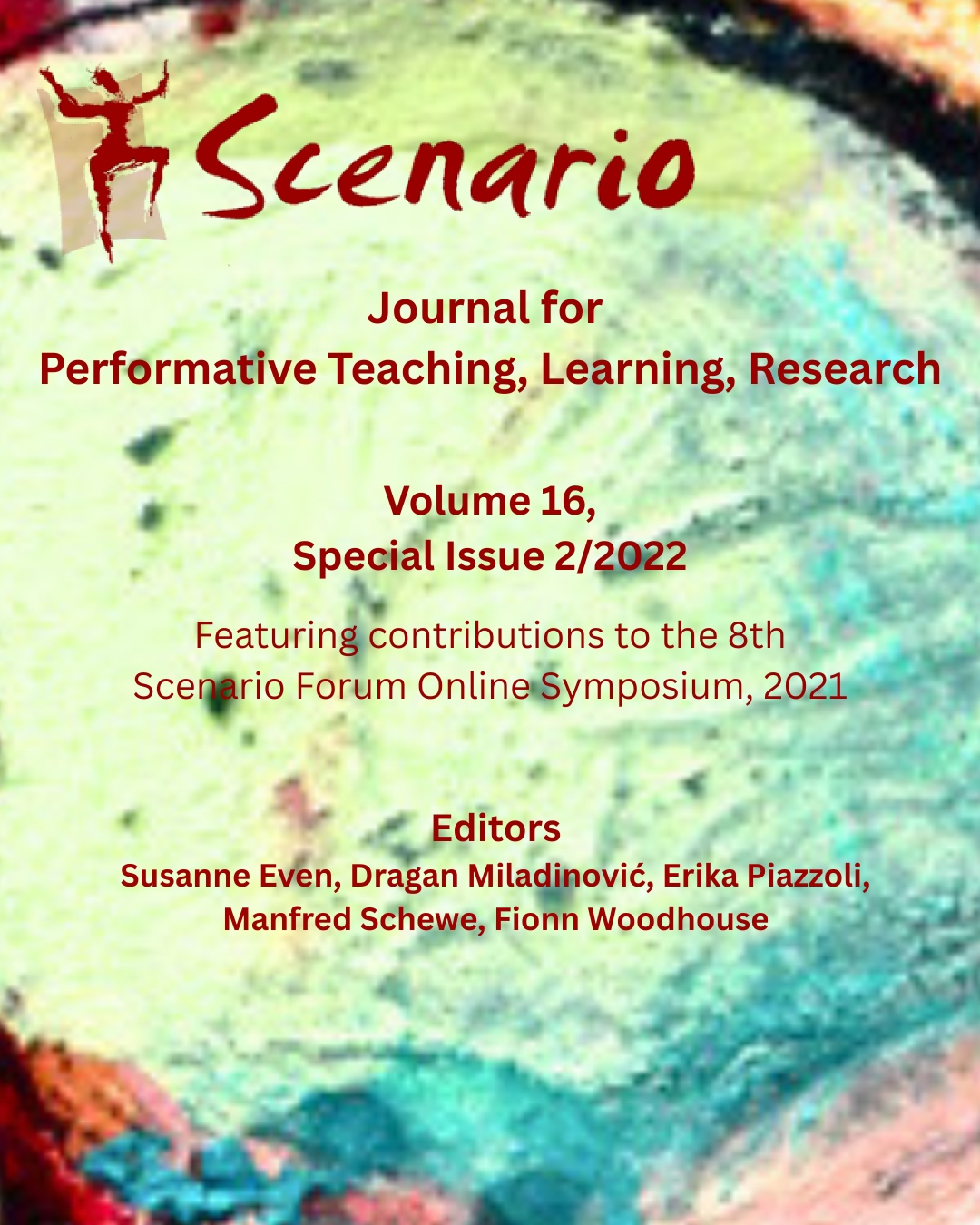Teaching and learning online through performing arts: Puppetry as a pedagogical tool in higher education
DOI:
https://doi.org/10.33178/scenario.16.2.1Keywords:
Puppetry, Higher Education, Adaptative appropriation, Transformative appropriation, Learning dynamicsAbstract
Due to the coronavirus disease 2019 (COVID-19) pandemic, a Swiss university course called “Psychology and Migration” had to move online over the Spring semester 2021. In this course, Psychology and Education students learn about the sociocultural considerations of migration, through a theoretical, personal and artistic exploration of the subjective experience of migration, based on performing arts. As part of the main pedagogical strategies, students are invited to collectively create a short theatre play based on some selected literary texts. Under the conditions imposed by the pandemic, puppetry arts were chosen as a new tool for distance-learning. Collaborating with theatre professionals, the students created a short play, and performed it online using sock puppets, image theatre or object theatre. Using data collected during the course (video recordings of online sessions and students’ diaries), this article explores the critical process of reduction and expansion, and the (potentially) productive tensions that the course creates. It analyses two main appropriation modes for course students: in adaptative appropriation, students aim to reduce these tensions by adapting to the perceived expectations of teachers; in transformative appropriation, students creatively use possibilities offered by the course to conduct a personal exploration, integrating theories with their own experiences and questions.
References
Abed, O. H. (2016). Drama-based science teaching and its effect on students’ understanding of scientific concepts and their attitudes towards science learning. International Education Studies, 9(10), 163-173. https://doi.org/10.5539/ies.v9n10p163
Aden, J. (2018). Apprendre les langues par corps. In R. Lima et M-G Magalhães (Eds.) In Culturas e imaginários. Deslocamentos, interações e superposições, (pp. 127-139). Rio de Janeiro : 7Letras.
Aden, J., Clark, S. & Potapushkina-Delfosse, M. (2019). Éveiller le corps sensible pour entrer dans l’oralité des langues : une approche énactive de l’enseignement de l’oral. Lidil,59(2019), https://doi.org/10.4000/lidil.6047
Bale, R. (2020). Teaching with confidence in higher education: Applying strategies from the performing arts. Routledge. https://doi.org/10.4324/9780429201929
Berland, L. K., & Hammer, D. (2012). Framing for scientific argumentation. Journal of Research in Science Teaching, 49(1), 68-94. https://doi.org/10.1002/tea.20446
Branda, S., & Porta, L. (2012). Maestros que marcan. Biografía personal e identidad profesional en docentes memorables [Teachers who make a mark. Personal biography and professional identity in memorable teachers]. Revista de Currículum y Formación del Profesorado, 16(3), 231-243.
Cirelli, M., & Vital, M. B. (2018). La Biografía Escolar [School biography]. In N. Sgreccia (Ed.),
Procesos de acompañamiento en la formación inicial y continua de profesores en matemática (pp. 19-51). Fahren House.
Coulon, A. (1997). Le métier d’étudiant: l’entrée dans la vie universitaire. Educação e Pesquisa.
Feldman, K. (1997). Identifying exemplary teachers and teaching: Evidence from student ratings. In R. Perry & J. Smart (Eds.), Effective teaching in higher education: Research and practice (pp. 368-395). Agathon.
Franklin, M. B. (2000). Considerations for a psychology of experience: Heinz Werner's contribution. Journal of Adult Development, 7, 31-39. https://doi.org/10.1023/A:1009551001539
García, A. (2004). Comunicación y expresión oral y escrita: la dramatización como recurso. Raó.
Gravey, V., Lorenzoni, I., Seyfang, G., & Hargreaves, T. (2017). Theoretical theatre: Harnessing the power of comedy to teach social science theory. Journal of Contemporary European Research 13(3), 1319-1336. https://doi.org/10.30950/jcer.v13i3.824
Gutierrez, K. D., Larson, J., & Kreuter, B. (1995). Cultural tensions in the scripted classroom: The value of the subjugated perspective. Urban Education, 29(4), 410-442. https://doi.org/10.1177/0042085995029004004
Kloetzer, L., Henein, S., Tau, R., Martin, S., & Valterio, J. (2020). Teaching through performing arts in higher education: Examples in engineering and psychology. Scenario, 14(2), 1-25. https://doi.org/10.33178/scenario.14.2.1
Kloetzer, L., Tau, R., Valterio, J., & Henein, S. (2021). Performing arts as a tool for university education during a pandemic: Moving from an in vivo to an in vitro modality. Qwerty-Open and Interdisciplinary Journal of Technology, Culture and Education, 16(2), 47-68. https://doi.org/10.30557/QW000043
Konkola, R., Tuomi-Gröhn T., Lambert, P., & Ludvigsen, S. (2007). Promoting learning and transfer between school and workplace. Journal of Education and Work, 20(3), 211-228. https://doi.org/10.1080/13639080701464483
Kozulin, A. (1998). Psychological tools: A sociocultural approach to education. Harvard University Press.
Lilliedahl, J. (2018). Building knowledge through arts integration. Pedagogies: An International Journal, 13(2), 133-145. https://doi.org/10.1080/1554480X.2018.1454320
Maturana, H. & Varela, F. (1987/1994). L’arbre de la connaissance. Racines biologiques de la compréhension humaine. Paris : Addison-Wesley.
Prentice, C. M., & Kramer, M. W. (2006). Dialectical tensions in the classroom: Managing tensions through communication. Southern Communication Journal, 71(4), 339-361. https://doi.org/10.1080/10417940601000436
Read, H. (1943). Education through art. Faber and Faber.
Rooney, R. (2004). Arts-based teaching and learning: Review of the literature. VSA Arts/Westat.
Samaras, A. P. (2004). Learning zones: Potentials for cognitive change in teacher education programs. Invited talk, University of Hawaii, Department of Education, Honolulu, Hawaii.
Schonmann, S. (Ed.). (2011). Key concepts in theatre/drama education. Springer Science & Business Media. https://doi.org/10.1007/978-94-6091-332-7
Simamora, R. M. (2020). The challenges of online learning during the COVID-19 pandemic: An essay analysis of performing arts education students. Studies in Learning and Teaching, 1(2), 86-103. https://doi.org/10.46627/silet.v1i2.38
Syafii, M. L., Santoso, S., & Hartono, S. (2021). Story-telling technique utilizing puppets to enhance the learners' speaking competence. International Journal on Social and Education Sciences,3(2), 304-341. https://doi.org/10.46328/ijonses.70
Tau, R., Kloetzer, L., & Henein, S. (2021). The dimension of the body in higher education: Matrix of meanings in students’ diaries. Human Arenas, 5(2022), 1-28. https://doi.org/10.1007/s42087-021-00206-1
Taylor, J. A. (2008). From the stage to the classroom: The performing arts and social studies. The History Teacher, 41(2), 235-248.
Vygotsky, L. S. (1978). Mind in society: The development of higher psychological processes (M. Cole, V. John-Steiner, S. S. Scribner & E. Souberman, Eds.). Harvard University Press.
Vygotsky, L. S., van der Veer, R. E., Valsiner, J. E., & Prout, T. T. (1994). The Vygotsky reader. Basil Blackwell.
Werner, H. (1980). Comparative psychology of mental development (Rev. ed.). International Universities Press.
Xu, S., Wang, J., & Tateo, L. (2021). Dramatizing living-in-the-world: Affective generalization in drama-in-education workshop. Integrative Psychological and Behavioral Science, 1-29. https://doi.org/10.1007/s12124-021-09625-9
Downloads
Published
Issue
Section
License
Copyright (c) 2022 Laure Kloetzer, Ramiro Tau

This work is licensed under a Creative Commons Attribution-NonCommercial 4.0 International License.







